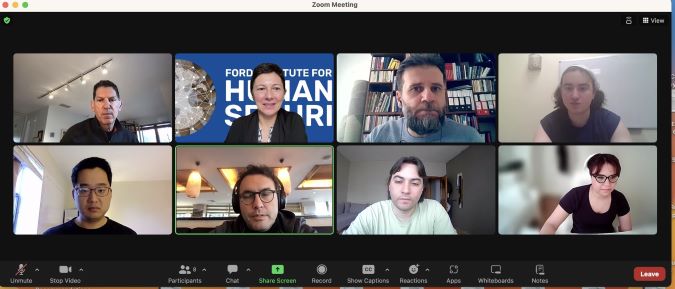Faculty Leader: Dr. Müge Finkel
Faculty Partners: Dr. Steven E. Finkel (Department of Political Science), Dr. Keila Grinberg (Department of History & Center for Latin American Studies), Dr. Erdem Yörük (Koç University - Department of Sociology & Director of Center for Computational Social Sciences), & Dr. Ali Hürriyetoğlu (Radboud University)
2023-2024
In the fall of 2023, the Ford Institute launched the 'Online Violence Against Women in Politics’ international working group in partnership with Koç University (Istanbul). The 'Online Violence Against Women in Politics' (OVAW-P) working group is the first international working group at the Graduate School of Public and International Affairs (GSPIA). It plans to present its initial findings at an international conference in July of 2024. Online Violence Against Women in Politics is investigating a new and growing threat against women in politics- those who are in elected positions and aspirants. Full and equal participation of women in political decision-making is a necessary component of democratic governance and sustainable development and contributes to improved public trust in policy processes. However, as women’s participation and representation in politics increases, so does their risk of becoming victims of political violence.
Research Highlights:
- Working Group Meetings:
- With an international team, our members often meet via Zoom to discuss progress on data collection and analysis. AI models adapted by Koç University’s researchers are being trained to detect the types and levels of intensity of hate speech directed at candidates in recent Turkish Parliamentary elections. This work will be applied to develop case-study reports that the team hopes to present in upcoming conferences. It will also serve as a basis for continued research on online gender-based violence in future elections.
 Pictured above, from top left to bottom right: Dr. Steven Finkel, Dr. Müge Finkel, Fırat Durusan, Amanda Zaner, Jungmin Han, Erdem Yörük, Melih Can Yardı, and Işık Topçu.
Pictured above, from top left to bottom right: Dr. Steven Finkel, Dr. Müge Finkel, Fırat Durusan, Amanda Zaner, Jungmin Han, Erdem Yörük, Melih Can Yardı, and Işık Topçu. - HSD-2Lang 2024 Hate Speech Detection Competition:
-
Işık Topçu and her colleague, Ehsan Barkhordar, had the opportunity to compete together in the Sabancı University "HSD-2Lang 2024" Hate Speech Detection Shared Task Competition, in partnership with Case@EACL 2024. Işık and Ehsan worked together to test various machine-learning model types and sampling techniques for the competition, which was a great case study for hate speech detection in Turkish.
The competition consisted of two subtasks:
1. Hate Speech Detection in Turkish tweets across many contexts: a. Israel-Palestine Conflict, b. Anti-Refugee Sentiment c. Turco-Greek conflict.
2. Hate Speech Detection on limited data in Arabic.
Işık shared some tips she acquired about using BERT-based (Bidirectional Encoder Representations from Transformers) deep-learning models for the competition:
1. Having meticulously labeled and adjudicated training data is one of the most important factors.
2. Precautions to prevent overfitting must be taken, and testing on a labeled dataset should occur after the validation sample. Overfitting is a common issue in machine learning and deep learning, where a model learns the training data too well, capturing details to the extent that it negatively impacts the model's performance on new, unseen data.
3. Even with very straightforward data, resampling significantly improves test data performance.
4. Experimentation is everything. Testing as many pre-trained models and pre-processing steps as possible is important.
5. We have to meticulously pre-process the training data without erasing important information for the model. Removing URLs and @mentions might help the performance. But #hashtags themselves may be considered hate speech.
6. The targeting issue is quite a firey debate in current hate speech shared tasks. Ali Hocam and Işık are encountering more labeled datasets with hundreds of ethnicity targets labeled in their current work.
7. The team worked well with de-mojifying in Turkish. (changing the emojis 🙂 to ":gulen_surat" as text.)
Competition results will be released at a later date, but these tips Işık learned will translate well to support continued research with the OWAW-P project.
Student Researchers:
- Fırat Durusan (PhD Candidate, Koç University)
- Işık Topçu (MA Candidate, Koç University)
- Melih Can Yardı (MA Candidate, Koç University)
- Jungmin Han (PhD Candidate, Department of Political Science)
- Amanda Zaner (MID, GSPIA)
- Vanessa Thompson (MPPM, GSPIA)
- Chelsie Spinner (PhD Candidate, GSPIA)
